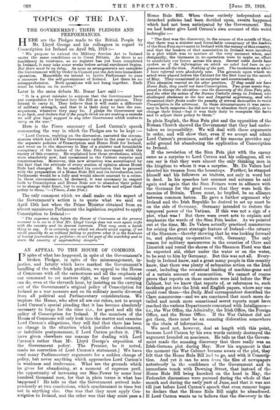TOPICS OF THE DAY.
THE GOVERNMENT : THEIR PLEDGES AND PERFORMANCES. HER E are the Pledges made to the British People -by Mr. Lloyd George and his colleagues in regard to Conscription for Ireland on April 9th, 1918 :— " We propose to extend the Military Service Act to Ireland under the same conditions as in Great Britain. As there is no machinery in existence, as no register has yet been completed in Ireland, it may take some weeks before actual enrolment begins. But there must be no delay. Ae soon as arrangements. are-complete the Government will-by Order in Council put the Act into immediate operation. Meanwhile we intend to invite Parliament to pass a measure for the self-government of Ireland. Let there be no misapprehension. Both questions will not hang together. Each must be taken on its merits."
Later in the same debate Mr. Boner Law said :— " It is a Feat mistake to suppose that the Government have put compulsion for Ireland into the Bill as a pious opinion. They intend to carry it. They believe that it will make a difference of military strength, and that it Is their duty to face the con- sequences, whatever they may be. I pledge the Government not to go back, and declare that if the people think we are making a mistake we will give loyal support to any other Government which wishes to carry on the war."
Here is the Times summary of Lord Curzon's speech announcing the way in which the Pledges are to be kept :- "Lord Curzon, replying on the discussion, narrated the circum- stances which had led the Government earlier in the year to adopt the separate policies of Cormaription and :Home Rule for Ireland, and went on to the discovery in May of a sinister and formidable conspiracy of the leaders of the Sinn Fein movement with the enemy of this country. He explained how those revelations, which were absolutely new, had occasioned in the Cabinet surprise and consternation. Moreover, this new situation was accentuated by the fact that the attitude of every section of opinion about Home 'Rule had changed. • So he reached his conclusion that to proeeed with the preparation of a Home Rule Bill and its introduction into Parliament would be a folly and -would almost amount to a crime. In these circumstances, he declared, it was necessary in -respect both to Conscription and Home Rule not to abandon their policy or to -change their front, but to recognize the facts and adjust their policy to them."—(Times, June 2l et.) The only comment which we shall make on this aspect of the Government's action is to quote what we said on April 13th last when the Prime Minister obtained from an almost. unanimous. Parliament the legislation required to apply Conscription to Ireland:— "The supreme duty before the House of Commons at the present moment is to see to it that Mr. Lloyd George does not once again trifle with the country and its dearest interests. That may seem a harsh thing to say. It is certainly one which we should avoid saying, if we could possibly do so without failing to perform what it is the business of honest journalism to perform—to act the part of the watchdog and to warn the country of approaching dangers."


























 Previous page
Previous page